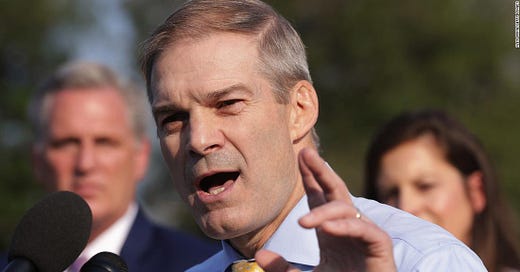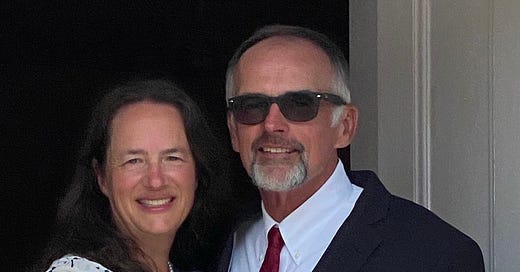
On Thursday, September 19, the day after the Federal Reserve began to lower interest rates two and a half years after it began to raise them to get inflation under control, President Joe Biden spoke to the Economic Club of Washington, D.C., a nonprofit, nonpartisan forum where leaders from around the world can speak to larger questions about the global economy.
Biden noted the interest rate cut and identified it as an important signal from the Federal Reserve to the nation that inflation, which at its post-pandemic peak was 9.1%, has come down close to the Fed’s target rate of 2%. He described it as “a declaration of progress…a signal we’ve entered a new phase of our economy and our recovery.”
But Biden told the audience he was “not here to take a victory lap.” Instead, he wanted to “speak about…how far we’ve come, how we got here, and, most importantly, the foundation that I believe [we’ve] built for a more prosperous and equitable future in America.” He wanted, he said, to make the country realize how much progress we’ve made, because if we don’t, the negative economic mindset he attributes to the pandemic will “dominate our economic outlook,” and we will miss “the immense opportunities in front of us right now.”
Biden reminded the audience that when he and Vice President Kamala Harris took office in January 2021, having “inherited the worst pandemic in a century and the worst economic crisis since the Great Depression,” they found “there was no real plan in place—no plan to deal with the pandemic, no plan to get the economy back on its feet. Nothing—virtually nothing.” The nonpartisan Congressional Budget Office predicted the U.S. wouldn’t see a full economic recovery until at least 2025.
But, Biden said, he “came into office determined not only to deliver immediate economic relief for the American people but to transform the way our economy works over the long term; to write a new economic playbook,” investing in ordinary Americans and promoting fair competition.
Immediately, Biden and the Democrats passed the American Rescue Plan—without a single Republican vote—to launch “one of the most sophisticated logistical operations in American history” to get coronavirus vaccines into every person in America. Without addressing the pandemic, there could be no economic recovery, he said. The American Rescue Plan also “delivered immediate economic relief for those who needed it the most,” preventing “a wave of evictions, bankruptcies, and delinquencies and defaults” like those that had followed economic crises in the past and had “weakened the recovery and left working families permanently further behind,” a process Treasury Secretary Janet Yellen called “economic scarring.”
The economic crash had tanked local and state tax revenues, so the administration funded state and local governments to keep teachers and first responders working, small businesses open, and more housing being built. It expanded the Child Tax Credit, which cut child poverty in half. The American Rescue Plan included the Butch Lewis Act, which protected the pensions of millions of union workers and retirees.
During the pandemic, factories shut down, and supply chains—from shipping to port operations to trucking networks—were tangled. The reopening of the global economy sent inflation skyrocketing, and then Russia’s February 2022 invasion of Ukraine sent food and oil prices even higher.
Biden reminded the members of the Economic Club of the massive cargo ships stuck outside the Port of Los Angeles before the 2021 holidays, and the shortage of baby formula, and explained that his administration brought together business and labor to repair supply chains and “unclog our ports, trucking networks, and shipping lines.” (Although Biden didn’t note it, Republicans in 2021 suggested that the “reckless spending” of the American Rescue Plan meant that Christmas would be “ruined,” but the administration worked to smooth out the tangles and by July 2024 the Port of Los Angeles saw record-breaking volume passing through it, up 37% from July 2023.) Biden also released oil reserves to stabilize global markets and increased energy production to record highs. Together, these measures began to ease inflation.
Nonetheless, Biden said, critics claimed that the economic supports of the American Rescue Plan would make people leave the labor market—remember “The Great Resignation”?—and that it would take significant unemployment to lower prices. But rather than backing off, Biden and Harris seized the moment to invest in the United States. They wrestled the Bipartisan Infrastructure Law through Congress to rebuild roads, bridges, ports, airports, trains, and buses; to remove lead pipes from schools and homes; and to provide affordable high-speed internet access to every American.
The administration insisted that U.S. contracts must use U.S. workers and U.S. products. With the CHIPS and Science Act, it brought back semiconductor chip manufacturing to the U.S., and private companies from around the world are investing tens of billions of dollars in new chip factories in the U.S. that are already employing construction workers and will soon employ factory workers. Factory construction is at a record high now, and the Biden-Harris administration created more than 700,000 manufacturing jobs.
Democrats passed the Inflation Reduction Act that will help cut carbon emissions in half by 2030 and is creating hundreds of thousands of clean energy jobs. That law also permits Medicare to negotiate drug prices with pharmaceutical companies, saving taxpayers an estimated $160 billion over the next decade.
With inflation under control and a record 16 million jobs created, the administration’s policies proved, Biden said, that it’s possible to bring down inflation while also safeguarding jobs and wages for American workers and promoting economic growth. A record nineteen million people have applied to start new businesses. More Americans have health insurance than ever before. The racial wealth gap is the smallest in 20 years. And rather than creating a recession, these measures kept economic growth above 3% last year. The stock market is at record highs.
Biden contrasted his economic policies, based in the idea that the economy grows from the middle out and the bottom up, with those of former president Trump, whose policies of tax cuts for the wealthy and corporations are based in the idea that the economy grows best when markets drive it and that concentrating wealth at the top of society permits individuals to invest more efficiently than the government can. Biden noted that, in contrast to his own approach, Trump’s policies killed manufacturing jobs and saw very little factory construction, while creating the largest budget deficit in American history.
Biden listed these comparisons to make the point that, as he said, “[f]or the past 40 years, too many leaders have sworn by an economic theory that has not worked very well at all: trickle-down economics. Cut taxes for the very wealthy…and hope the benefits trickle down. Well, guess what? Not a whole lot trickled down to my dad’s kitchen table. It’s clear, especially under my predecessor, that trickle-down economics failed. And he’s promised it again—trickle-down economics—but it will fail again.” He noted, as former president Bill Clinton pointed out at the Democratic National Convention, that since 1989 the U.S. has created about 51 million jobs, and 50 million of them have come under Democratic presidents.
“I’m a capitalist,” Biden said, “[b]ut I believe capitalism is the greatest force to grow the economy for everybody.” He called for more affordable housing, affordable childcare, and lower healthcare costs, noting that those policies will increase economic growth. He called for higher taxes on the very wealthy to pay for those pro-growth policies and to cut the deficit.
And then Biden brought the economic discussion back to his argument before the State Department in 2021, just after he took office. He told the audience at the Economic Club that we have such a dynamic system, and foreign companies are willing to invest here, because of the stability provided in the U.S. by the rule of law. Indeed, it is the rule of law that protects investments and capital, as evidenced by the fact that autocrats stash their money not in their own countries or other dictatorships, but in liberal democracies where investments cannot be taken away or legal protections changed on a dictator’s whim.
After listing the extraordinary economic successes of the past three and a half years, Biden told the audience: “American business, our economic dynamism can’t succeed…without a stability and security that makes us the envy of the world.”
–-
Notes:
https://www.portoflosangeles.org/references/2024-news-releases/news_081324_july_cargo
https://www.reuters.com/business/biden-holding-meeting-supply-chain-issues-2021-12-22/










Thank you, Joe. History will remember.
And this is why I say Biden is the best president in my lifetime and my 90-year-old mother does too.